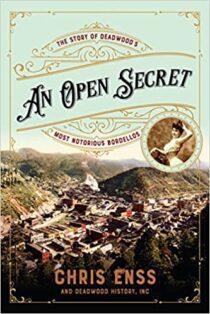Enter now to win an advanced copy of
An Open Secret: The Story of Deadwood’s Most Notorious Bordellos

In March 1902, police raided several houses of prostitution in the Bad Lands, taking into custody a number of bawdy women who owed the city money. A suffragette submitted a letter to the editor of the Weekly Pioneer Times expressing why she felt the arrests were discriminatory.
“I have wondered why these gentlemen [local politicians] allow wine rooms and dance halls to exist,” Mrs. Florence R. Curruthers wrote on March 6, 1902. “Are they for men only? Do you think women would go there if they didn’t expect the men to be there, and don’t the men expect the women to be there, or take them there? Why are not the men who frequent these places on the same level as the women not fined just the same? Perhaps it would place some of the respected citizens and perhaps an officer of the law in an embarrassing position at times. Because some of these gentlemen have been allowed to enter these places (by mistake, of course) and take a few drops with a gentleman friend. Now if they are allowed to run for traps, fine the men, too, and we could soon have asphalt walks and streets, instead of dilapidated excuses we have at present.
“Prostitution exists among the men as well as the women. Women prostitutes exist because there are men prostitutes. This is not an argument in defense of prostitution among women, but I believe in fair play. If you are going to enforce the law, enforce it, and not only half do it, by excluding the men.”
Owing to the combined efforts of temperance workers, members of the clergy, and concerned parents’ groups, the issue of prostitution became less of a problem between 1903 and 1905. The criminal element which had been omnipresent since Deadwood came into existence, for a time, kept themselves off the main thoroughfares of town and out of sight from polite society.
“Never in the history of Deadwood has the outlook for our city been so bright as the present,” an editorial in the September 28, 1905, edition of the Daily Deadwood Pioneer Times began about the civility that had overtaken the area. “The present tone of public sentient assures us a clean, moral atmosphere, wherein people need not fear to invest their money and build homes. Business interests have already taken a cue from this improved sentiment and are investing their money in building up the town. Just let the average man contemplate for a moment the large number of valuable enterprises now under way, or assured in the near future, and then let him ask himself if the change in moral sentiment has been a detriment or a benefit to the city?
“Business instinct in this matter is unerring. Men do not invest their money, nor people build homes in a town run by pimps, gamblers, and prostitutes. And just in proportion as we weed out these disreputable elements will our city flourish and become what its location and resources designed that it should be. Labor is all employed, and the crows of loafers which formerly blocked the sidewalks and saloons are conspicuous by their absence.”
In time, the sins that contributed to Deadwood’s reputation as a wild and uncivilized town reemerged from the shadows and the war against the brothels that flourished there raged on another seventy-five years.

To learn more about the soiled doves of Deadwood read An Open Secret

